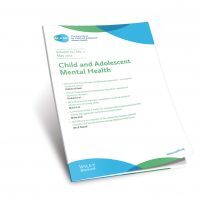Featured ACAMH Papers
-

Research Review: Measuring general mental health in early-mid adolescence: A systematic meta-review of content and psychometrics
Open Access paper from JCPP Advances – Adolescent mental health is a major concern and brief general self-report measures can facilitate insight into intervention response and epidemiology via large samples. However, measures’ relative content and psychometrics are unclear. A systematic search of systematic reviews was conducted to identify relevant measures. Louise Black et al.
Read more -

Emotional dysregulation in childhood and disordered eating and self-harm in adolescence: prospective associations and mediating pathways
Open Access paper from the JCPP – We examined prospective relationships between childhood emotional dysregulation and disordered eating and self-harm in adolescence; and social cognition, emotional recognition, and being bullied as mediators. Naomi Warne (pic) et al.
Read more -

Socioeconomic and sex inequalities in parent-reported adolescent mental ill-health: time trends in four British birth cohorts
Open Access paper from the JCPP – “Studies using symptom-based screeners have suggested that mental ill-health has increased in adolescents in recent decades, however, few studies have tested the equivalence of their instruments, which is critical for inferring changes in prevalence”. Eoin McElroy (pic) et al.
Read more -

Adolescent sleep, distress, and technology use: weekday versus weekend
Open Access paper from the CAMH journal 2023 Special Issue – Self-reported measures of sleep timing, chronotype (early, neither early nor late, late), technology medium (social media/texting, TV/streaming, and gaming), and psychological distress (DASS-21) were collected from 462 students attending one Australian high school. Alexander Reardon et al.
Read more -

Cyberbullying among adolescents in Turkey: the relationship between coping strategies and cyberbullying perpetration
Paper from the CAMH journal 2023 Special Issue – “Cyberbullying is becoming a global threat with the ease of access to the internet”. Eyüp Sabır Erbiçer et al.
Read more -

Technology Matters: Increasing access to evidence-based treatment for child anxiety problems: online parent-led CBT for children identified via schools
Open Access paper from the CAMH journal 2023 Special Issue – “Anxiety problems are extremely common and have an early age of onset. We previously found, in a study in England, that fewer than 3% of children with an anxiety disorder identified in the community had accessed an evidence-based treatment (Cognitive Behavioural Therapy; CBT)”. Iheoma Green (pic) et al.
Read more -

Review: Can digital mental health interventions bridge the ‘digital divide’ for socioeconomically and digitally marginalised youth? A systematic review
Open Access paper from the CAMH journal 2023 Special Issue – “This review aims to investigate the characteristics, acceptability and efficacy of DMHIs specifically developed for socioeconomically and digitally marginalised youth”. Rowena Piers (pic) et al.
Read more -

Associations between emotion recognition and autistic and callous-unemotional traits: differential effects of cueing to the eyes
Open Access paper from the JCPP – We tested whether cueing to the eyes improved emotion recognition in relation to autistic and CU traits in a heterogeneous sample of children enhanced for social, emotional and behavioural difficulties. Virginia Carter Leno et al.
Read more -

Annual Research Review: Stability of psychopathology: lessons learned from longitudinal population survey
Open Access paper from the JCPP – “Psychopathology has been long recognized as a fluctuating process with various expressions over time, which can only be properly understood if we follow individuals and their social context from childhood up until adulthood”. Albertine J. Oldehinkel (pic) and Johan Ormel
Read more -

Review: Interventions addressing loneliness amongst university students: a systematic review
Open Access paper from the CAMH journal – “Loneliness is detrimental to mental health, with university students at higher risk of feeling lonely than other population groups”. Olivia Betty Ellard et al.
Read more